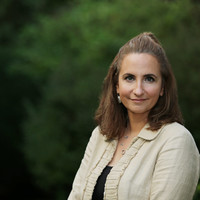My grandmother once told me the story of the Greek "no."
Greeks, you may or may not know, mime the word "no" differently. Instead of moving their heads side to side in a shake, they lift their chins imperiously, raising their eyebrows, in a motion both striking and confusing in its similarity to the nod that means "yes" in almost every other language.
My Yia-Yia, her fierce eyes shining under the canopy of a yellow and black silk headscarf, explained it to me thusly:
"During the occupation" — a mild way of putting hundreds of years of Ottoman rule over Greece — "the Turks held their curved swords underneath the Greeks' chins ... "
Here, she would demonstrate with a finger to her throat.
"And they asked, 'Will you swear to Allah?' If the Greeks shook their head 'no' ... "
Again, she would mime, showing the sword-finger's deadly path across her neck.
"Instead," she explained, "they said 'no' like this."
Then, she would click her tongue in disgust, raising her eyebrows and chin as high as they could go, creating a dramatic and perfect Greek "no."
"It's true," she told me, with finality.
I did not as a child, nor ever after, respond with my current belief, that the story seems highly unlikely to have even the slightest basis in truth.
I did not explain that the Ottoman Empire didn't, historically, much care for forced conversions, nor did I point out that if they had, when the Greeks said "no," they probably were headed for a beheading no matter which way they moved their heads to say it.
I did not express my uneducated guess that the reason for the divergence from custom was far more likely explained by the Greek contrarian spirit. I mean, come on, we spit at cute babies.
I did not say any of those things because I understood then, as I do now, that the Turks, in the minds of my grandmother and those of her generation, were something more than real.
The Turks were, in their minds and in their memories, both actual oppressors and cartoonish boogeymen. They were a true evil stretched out to fantastical proportions.
Some of my grandmother's older relatives knew of or had themselves been subjected by Turks to forced migrations, military conscriptions, ill-treatment and starvation in Anatolia. My great-grandfather, her husband's father, had been exiled from Turkey in the mass exchange of Christians and Muslims that took place in 1923. He almost certainly had heard of or even seen for himself the massacres of Pontic Greeks and Armenians that had taken place there.
Therefore, I could not and do not blame my grandmother for seeing Turks behind every tree, like marauding intruders, for alternately blaming them for and crediting them with creating almost every aspect of the Greek experience.
For great sins, and those who committed them, can live on.
We cannot, sometimes, escape these villains, even when they present to us no current threat, even after they're gone, even when their bones and the bones of all those they hurt have been turned to dust.
It does no good to deny them, to pretend as if the scars weren't real, to tell ourselves that it was so, so long ago. Because perhaps, probably, clearly, it hasn't been long enough.
That's the only way out, after all. Like water over a pebble, only time can remove the sharp edges from sin.
One day, we won't remember what our father's father's father said, the stories they told of the hunger and the deprivation and the suffering. We won't remember the cruelty.
Only then — when it has been ages and years directly proportional to the evil and the length of time for which it was perpetrated — well, then, maybe it will be enough.
Maybe, then, we will forget.
To learn more about Georgia Garvey, visit GeorgiaGarvey.com.
Photo credit: stevepb at Pixabay






View Comments